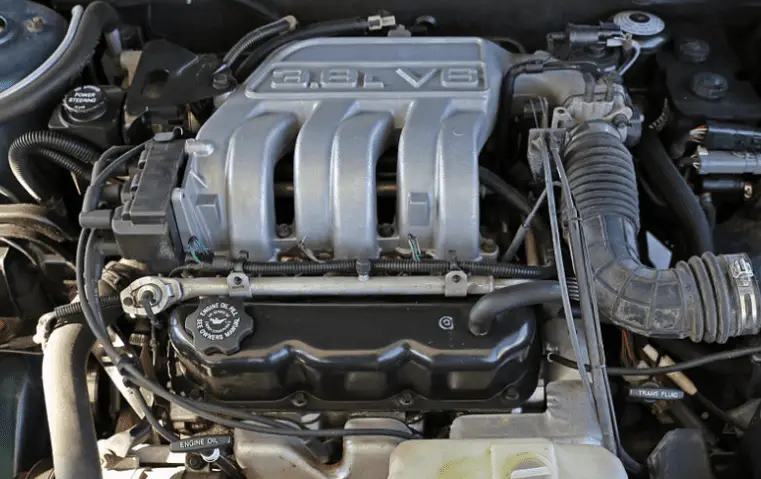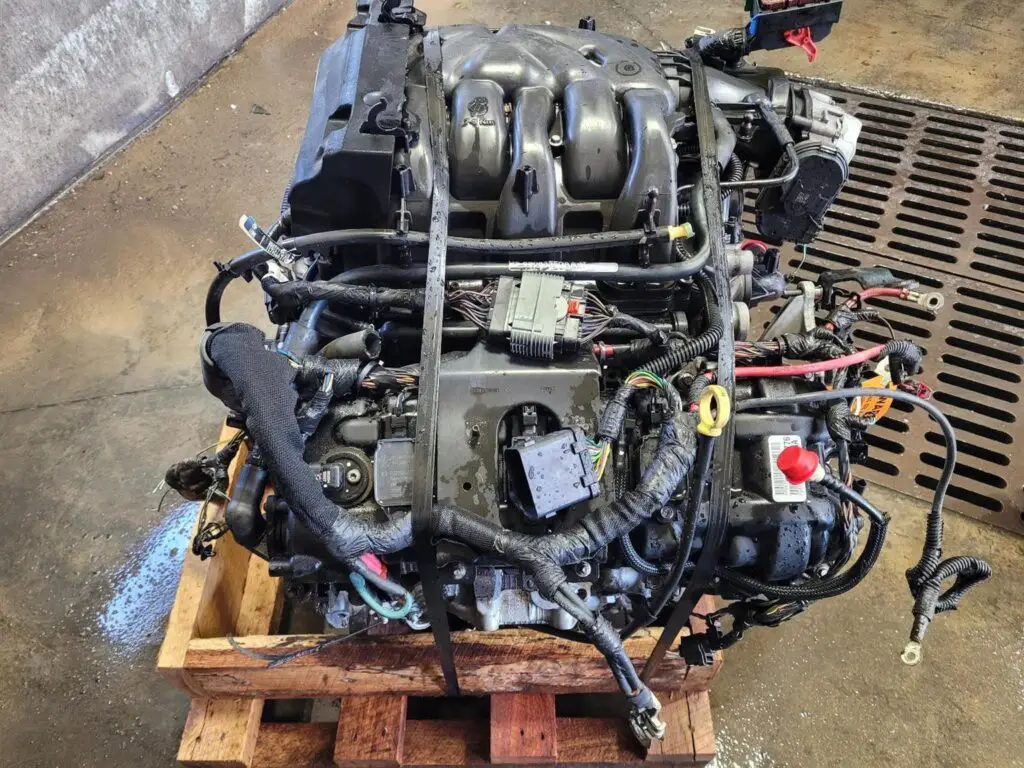Jeep 3.8 engine problems include excessive oil consumption, engine misfires, timing chain issues, and cracked exhaust manifolds. These issues can often be addressed with regular maintenance and timely repairs, such as replacing worn components and monitoring oil levels.
The Jeep 3.8L V6 engine, first introduced in the 2007 Jeep Wrangler JK, is part of Jeep’s effort to provide a reliable yet powerful engine for its off-road vehicles. While this engine has been used in various Jeep models, including the Wrangler, Liberty, and Commander, it has faced some common issues that owners should be aware of. Knowing these problems can help Jeep owners troubleshoot potential concerns early on and take the necessary steps to keep their vehicles running smoothly.
In this blog post we will explain the most common Jeep 3.8 engine problems, the causes behind them, and the solutions to keep the engine in optimal condition.

Contents
Common Jeep 3.8 Engine Problems
The Jeep 3.8L V6 engine, while reliable for many owners, has experienced some recurring issues over time. Identifying these common problems can help you address them early and ensure the vehicle continues to perform optimally.
1. Excessive Oil Consumption
One of the most frequently reported issues with the Jeep 3.8 engine is excessive oil consumption. Jeep owners, especially those with the 2007-2010 models, have reported that their engines tend to consume more oil than expected, requiring frequent oil top-ups. If left unchecked, this can lead to engine damage due to oil starvation.
Symptoms of Excessive Oil Consumption:
- Low oil levels between oil changes
- Oil warning light coming on frequently
- Visible smoke from the exhaust, usually blue in color
Potential Causes:
- Worn piston rings: Piston rings that have worn out over time may allow oil to leak into the combustion chamber, where it is burned along with the fuel, leading to excessive oil consumption.
- Valve seal failure: The valve seals help control oil flow into the combustion chamber. If they fail, they can allow oil to seep in, causing increased oil consumption.
- PCV valve failure: The Positive Crankcase Ventilation (PCV) valve allows gases to escape from the crankcase. A malfunctioning PCV valve can lead to increased oil consumption.
Solutions:
- Regularly monitor oil levels and top up as needed.
- Use high-quality, manufacturer-recommended oil to prevent excessive consumption.
- Have your engine inspected by a mechanic if oil consumption becomes a recurring issue. In some cases, replacing the piston rings, valve seals, or PCV valve may be necessary.
2. Exhaust Manifold Cracks
Exhaust manifold cracks are another common problem in the Jeep 3.8L engine, particularly in models with higher mileage. These cracks often develop over time due to heat cycling and the stress placed on the exhaust manifold. When the exhaust manifold cracks, it can lead to exhaust leaks that can affect engine performance and fuel efficiency.
Symptoms of Exhaust Manifold Cracks:
- Loud engine noise, particularly during acceleration
- Decreased engine power
- Poor fuel efficiency
Potential Causes:
- Overheating of the engine can cause the manifold to expand and contract, leading to cracks.
- Poor quality or rusted components in the exhaust manifold can increase the likelihood of cracks.
Solutions:
- Inspect the exhaust manifold regularly for cracks and leaks.
- If cracks are found, replace the exhaust manifold promptly to prevent further engine damage.
- Consider using a higher-quality exhaust manifold or upgrading to a more durable part.
3. Engine Misfires
Engine misfires are another issue that has been reported by Jeep 3.8 engine owners. A misfire occurs when one or more cylinders fail to fire correctly, leading to rough idling, loss of power, and potential damage to the engine. Misfires can be caused by faulty spark plugs, ignition coils, or fuel injectors.
Symptoms of Engine Misfires:
- Rough idling or hesitation during acceleration
- Decreased engine performance and power
- Illuminated check engine light or misfire codes
Potential Causes:
- Worn spark plugs: Spark plugs that are worn or dirty may fail to ignite the air-fuel mixture properly, leading to misfires.
- Faulty ignition coils: The ignition coil is responsible for generating the electrical spark needed to ignite the fuel. If the coils are defective, the engine may misfire.
- Clogged fuel injectors: Fuel injectors that are clogged with dirt or debris can disrupt the flow of fuel into the combustion chamber, causing misfires.
Solutions:
- Replace worn or damaged spark plugs and ignition coils as recommended by the manufacturer.
- Clean or replace clogged fuel injectors.
- Perform regular engine diagnostics to identify misfires early on and prevent further damage.
4. Oil Starvation and Engine Failure
Oil starvation is a serious issue that can cause catastrophic engine failure if not addressed in time. This issue occurs when the engine is not properly lubricated, often due to low oil levels or a failing oil pump. In some cases, Jeep 3.8L engines have experienced oil starvation, leading to engine knocking, excessive wear, or even total engine failure.
Symptoms of Oil Starvation:
- Low oil pressure warning light on the dashboard
- Knocking or tapping noises from the engine
- Overheating engine or strange smells
Potential Causes:
- Low or dirty oil due to infrequent oil changes
- Faulty oil pump that fails to circulate oil properly
- Clogged oil passages or oil filter
Solutions:
- Regularly check oil levels and change the oil as recommended by the manufacturer.
- Replace the oil pump if it’s malfunctioning or if low oil pressure is detected.
- Inspect the oil filter and oil passages for blockages.
5. Timing Chain Issues
The Jeep 3.8L engine relies on a timing chain to keep the camshaft and crankshaft in sync. Timing chain issues are less common but have been reported in some cases, particularly in vehicles with higher mileage. A worn or stretched timing chain can lead to poor engine performance, engine misfires, and even severe engine damage if not addressed.
Symptoms of Timing Chain Issues:
- Engine misfires or rough idling
- Unusual rattling or knocking sounds from the engine
- Check engine light or timing-related error codes
Potential Causes:
- The timing chain may stretch or wear over time due to inadequate lubrication or poor maintenance.
- Faulty timing chain tensioners that fail to keep the timing chain tight can lead to slippage and engine performance issues.
Solutions:
- Regularly check the timing chain and related components during routine maintenance.
- If you hear unusual sounds or notice engine performance issues, get the timing chain inspected and replaced by a professional mechanic.
- Keep up with oil changes to ensure the timing chain remains well-lubricated and in good condition.

Maintenance Tips to Prevent Jeep 3.8 Engine Problems
To keep your Jeep 3.8L engine running smoothly and minimize the risk of these common problems, follow these maintenance tips:
- Regular Oil Changes: Use high-quality, manufacturer-recommended oil and change it at the recommended intervals to keep the engine properly lubricated.
- Inspect Engine Components: Regularly inspect components like the exhaust manifold, timing chain, and oil pump to prevent early wear and tear.
- Replace Spark Plugs and Ignition Coils: These are crucial components for proper engine combustion, so make sure they are replaced as needed.
- Maintain the Cooling System: Ensure that the radiator, thermostat, and cooling fans are working correctly to avoid overheating issues.
- Monitor Oil Levels and Cleanliness: Regularly check oil levels and top up as necessary. Ensure that the oil is clean to avoid engine damage caused by sludge or contaminants.
Frequently Asked Questions
Here are some FAQs about Jeep 3.8 engine problems –
1. What causes excessive oil consumption in the Jeep 3.8 engine?
Excessive oil consumption is often caused by worn piston rings, faulty valve seals, or issues with the PCV valve, all of which allow oil to enter the combustion chamber.
2. How can I prevent my Jeep 3.8 engine from stalling?
To prevent stalling, regularly replace fuel filters, clean fuel injectors, and inspect the crankshaft and camshaft position sensors for malfunctions.
3. Is timing chain failure common in the Jeep 3.8 engine?
While not as common, timing chain failure can occur in older models or those with high mileage due to poor maintenance or inadequate lubrication.
4. What should I do if my Jeep 3.8 engine is making knocking noises?
If you hear knocking sounds, check for low oil levels, inspect the oil pump and oil passages, and have the engine checked for bearing wear or oil starvation.
5. How often should I change the oil in my Jeep 3.8 engine?
Oil changes should be performed every 5,000 to 7,500 miles, depending on driving conditions and the manufacturer’s recommendations.
Conclusion
The Jeep 3.8L engine is generally a reliable and robust engine used in many Jeep models. However, it is not without its problems. Issues like excessive oil consumption, engine misfires, and timing chain problems can affect the engine’s performance and longevity. By staying on top of maintenance and addressing issues as soon as they arise, Jeep owners can ensure that their vehicles continue to provide reliable performance for years to come.